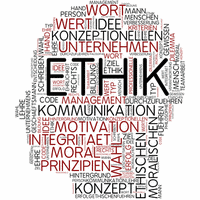Ethical standards for public relations research and measurement?
The meaning of data is unbroken in the field of public relations. Whether it is to generate new research findings or – quite practical – to detect PR outputs based on measurement metrics. But what is the role of values such as integrity, fairness, and truth in data search and data illustration? Are there any ethical standards for PR research and the measurement of communications – besides the current standards for PR measurement?
Studies of ethical guidelines for the evaluation of communication and in the PR research are several lacking as stated by the professors Shannon Bowen and Don W. Stacks in an article in Public Relations Journal (Vol. 7, 2013). But the field of public relations is in great need of ethical standards – because they express the growing professionalization of the field. There are commonly agreed statements required which focus the treatment of both data and humans as well as the values underlying the meaning of data as stated by the authors.
Interest in knowledge & research design
How do professional associations that deal with public relations research in science and practice express codes of ethics? What principles are espoused? To explore more in detail what the status quo of ethical standards of PR organizations is, Bowen and Stacks have collected and evaluated information on codes of ethics and ethical guidelines of 14 professional associations – both professional and academic. The collected statements were compared with five ethical principles and 18 core values by the authors.
Core values of PR research: Proposal of an ethical statement
Based on theoretical findings and the collected guidelines, the authors suggest the following statement to guide research standards in public relations:
„Research should be autonomous and abide by the principles of a universalizeable and reversible duty to the truth, dignity and respect for all involved public and stakeholders, and have a morally good will intention to gather, analyze, interpret, and report data with veracity.“ (Shannon/Bowen 2013: 20)
The obligation to the public and all stakeholders as well as the veracity and a good will intention is exposed in particular. The ethics statements which was proposed by the authors takes reference to the categorical imperative of Immanuel Kant, and remains on an abstract level. Whether the proposal will be adopted into practice, discussed and enhanced remains to be seen. Even the frequent discussed question on the effects of codes of ethics will not be discussed further at this point.
Limitations & Challenges - a conclusion
The authors examined a few – only U.S. based – professional associations. Thus, the study represents only a qualitative attempt to describe the status quo of ethics standards in PR research. In future, empirical studies should particularly follow up on this as stated by the authors.But it is important that the article draws attention to what was supposed to be self-evident in times of continuous collection and evaluation of data: Ethical principles in the measurement of communication – both in academic PR research and in the practice of PR.
The article of the PR journal is available free of charge here.
About the authors
Don W. Stacks, Ph.D., is Professor at the School of Communication at the University of Miami. Shannon A. Bowen, Ph.D., is Associate Professor at the School of Journalism and Mass Communications at the University of Miami.
References
Stacks, Don W./ Bowen, Shannon A. (2013): Toward the Establishment of Ethical Standardization in Public Relations Research, Measurement and Evaluation. Public Relations Journal, 7 (3).
back to News


